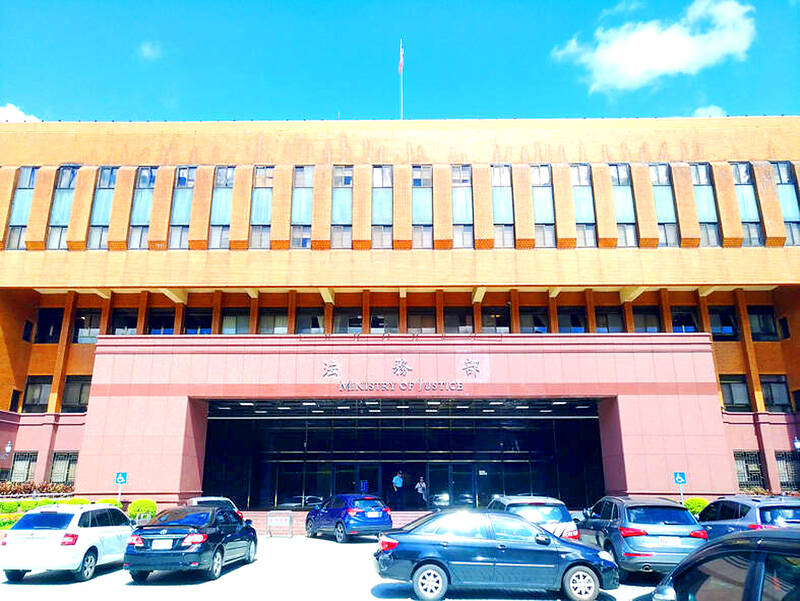The Ministry of Justice on Friday denied accusations that it was unwilling to carry out death sentences, saying that all 37 inmates on death row in Taiwan are in the process of applying for legal remedies.
The prisoners have brought their cases to the Constitutional Court and have therefore received a legally guaranteed stay of execution, the ministry said in a statement.
Chinese Nationalist Party (KMT) vice presidential candidate and Broadcasting Corp of China chairman Jaw Shaw-kong (趙少康) criticized the governing Democratic Progressive Party (DPP) earlier this week, saying it was neither trying to abolish capital punishment nor daring to carry out executions.

Photo: Wu Cheng-feng, Taipei Times
Two people have been put to death under capital punishment laws since the DPP was elected into office in May 2016.
In response, the ministry said the implementation of the death penalty could only be immediate if the remedy process were eliminated, but doing so might contravene Taiwan’s legal system.
Taiwan has written two UN human rights-related covenants into domestic law — namely the International Covenant on Civil and Political Rights (ICCPR) and the International Covenant on Economic, Social and Cultural Rights (ICESCR).
Taiwan’s presidential candidates discussed the death penalty in a televised debate last week, with only the KMT’s presidential candidate, New Taipei City Mayor Hou You-yi (侯友宜), clearly stating his opposition to abolishing capital punishment.
DPP presidential candidate Vice President William Lai (賴清德) said it was a sensitive issue in any country and that abolishing it requires a high degree of public support.
While neither the ICCPR nor the ICESCR requires abolishing the death penalty, they do call for extra discretion in deciding whether to carry out executions, Lai said.
The ICESCR does not mention the death penalty.
The ICCPR says it “may be imposed only for the most serious crimes in accordance with the law” and can only be carried out “pursuant to a final judgment rendered by a competent court.”
Meanwhile, Taiwan People’s Party Chairman and presidential candidate Ko Wen-je (柯文哲) said that given the global trend away from capital punishment, the only compromise he could think of was to not allow parole for people who have been sentenced to life imprisonment.

‘DENIAL DEFENSE’: The US would increase its military presence with uncrewed ships, and submarines, while boosting defense in the Indo-Pacific, a Pete Hegseth memo said The US is reorienting its military strategy to focus primarily on deterring a potential Chinese invasion of Taiwan, a memo signed by US Secretary of Defense Pete Hegseth showed. The memo also called on Taiwan to increase its defense spending. The document, known as the “Interim National Defense Strategic Guidance,” was distributed this month and detailed the national defense plans of US President Donald Trump’s administration, an article in the Washington Post said on Saturday. It outlines how the US can prepare for a potential war with China and defend itself from threats in the “near abroad,” including Greenland and the Panama

The Chinese Nationalist Party (KMT) is maintaining close ties with Beijing, the Democratic Progressive Party (DPP) said yesterday, hours after a new round of Chinese military drills in the Taiwan Strait began. Political parties in a democracy have a responsibility to be loyal to the nation and defend its sovereignty, DPP spokesman Justin Wu (吳崢) told a news conference in Taipei. His comments came hours after Beijing announced via Chinese state media that the Chinese People’s Liberation Army’s Eastern Theater Command was holding large-scale drills simulating a multi-pronged attack on Taiwan. Contrary to the KMT’s claims that it is staunchly anti-communist, KMT Deputy

RESPONSE: The government would investigate incidents of Taiwanese entertainers in China promoting CCP propaganda online in contravention of the law, the source said Taiwanese entertainers living in China who are found to have contravened cross-strait regulations or collaborated with the Chinese Communist Party (CCP) could be subject to fines, a source said on Sunday. Several Taiwanese entertainers have posted on the social media platform Sina Weibo saying that Taiwan “must be returned” to China, and sharing news articles from Chinese state media. In response, the Mainland Affairs Council (MAC) has asked the Ministry of Culture to investigate whether the entertainers had contravened any laws, and asked for them to be questioned upon their return to Taiwan, an official familiar with the matter said. To curb repeated

Myanmar has turned down an offer of assistance from Taiwanese search-and-rescue teams after a magnitude 7.7 earthquake struck the nation on Friday last week, saying other international aid is sufficient, the National Fire Agency said yesterday. More than 1,700 have been killed and 3,400 injured in the quake that struck near the central Myanmar city of Mandalay early on Friday afternoon, followed minutes later by a magnitude 6.7 aftershock. Worldwide, 13 international search-and-rescue teams have been deployed, with another 13 teams mobilizing, the agency said. Taiwan’s search-and-rescue teams were on standby, but have since been told to stand down, as